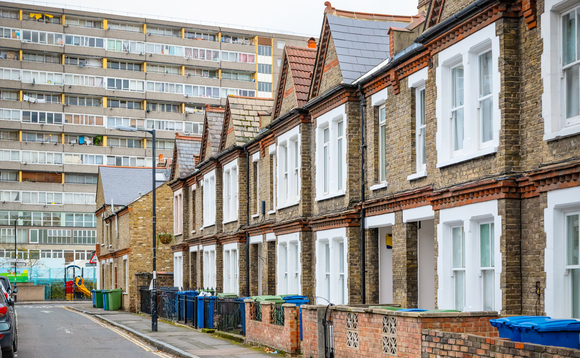
Friends of the Earth calls for a street-by-street insulation program for the most in-need neighbourhoods, after new study reveals huge extent of 'extreme' fuel poverty in the UK
Over a million households across the UK are experiencing 'extreme' fuel poverty with more than a fifth of their income required to cover energy bills as a result of soaring gas prices and chronically inefficient housing.
That is the stark conclusion of a new report from campaign group Friends of the Earth, which warns that despite the government's decision last week to extend its Energy Price Guarantee scheme by three months and recent falls in wholesale gas prices, millions of households are still facing fuel poverty.
The analysis concludes that one in five households - at least five million in total - are still experiencing fuel poverty in England and Wales this year. The government defines fuel poverty as a household that pays more than 10 per cent of its income to cover energy costs.
But today's new research also reveals that over a million households are experiencing what Freinds of the Earth has termed "extreme fuel poverty".
It said 742,200 households are spending between 20 to 30 per cent of their income on energy bills, while 196,500 are paying between 30 to 40 per cent, and a "shocking" 117,400 households will pay more than 40 per cent of their income towards energy bills.
The households hit by extreme fuel poverty are often caught in a cost spiral caused by low incomes - on average two-thirds below the national average - and disproportionately high fuel bills, largely as a result of poorly insulated housing.
Sana Yusuf, a warm homes campaigner at the charity, said: "The sheer number of people being forced to fork out on enormous energy costs - even with prices frozen by the government - is heartbreaking.
"While some people are risking their health, and even their lives, by keeping the heating off just to avoid paying unfair energy charges, others are racking up thousands of pounds in debt because they have no other choice if they want to stay warm and well.
"Alongside better targeted support, the government must address one of the key drivers behind our hyper-inflated bills - the UK's poorly insulated housing stock. With so few homes properly insulated in the neighbourhoods struggling most, rolling out a rapid, street-by-street programme of insulation is vital. This will save people hundreds of pounds each year on their energy bills and reduce the harmful emissions that cause climate change."
The report also identified 3,231 extreme fuel poverty hotspots where fuel poverty and low wages intersect. It found that one of the hardest hit areas is Sandwell, where over half of all neighbourhoods are affected by extreme fuel poverty. In Birmingham, Wolverhampton, Walsall, Bradford, and Blaenau Gwent, over 40 per cent of neighbourhoods are affected, it said.
In these hotspots, Friends of the Earth discovered that almost two thirds of homes are badly insulated, often lacking basic protection like loft and cavity wall insulation.
Simon Francis, coordinator of the End Fuel Poverty Coalition, said: "This new analysis confirms that even with an optimistic outlook for future energy prices and the government's financial support, there are huge numbers of people living in cold, damp and draughty homes.
"The government must respond to this analysis, and other similar studies, by backing a twin-track approach of properly investing in insulating homes of those in fuel poverty and longer-term reform of Britain's broken energy system so that people living on low-incomes can access get to cheaper energy."
The report was created as a part of the 'United for Warm Homes' campaign, a movement to support local campaign groups in petitioning government for insulation projects in their area.
The government has promised fresh action to improve energy efficiency across the UK, last autumn announcing a new goal to curb UK energy demand by 15 per cent by 2030, plans to invest £6bn in energy efficiency programmes from 2025, and for formation of a new Energy Efficiency Taskforce last November.
The members of the newly-formed Energy Efficiency Taskforce were revealed last week, with a senior figures from across the energy, building, and finance industries joining the group, which is co-chaired by Energy and Climate Minister Lord Callanan and NatWest CEO Alison Rose. The team new includes the chair of the National Infrastructure Commission Sir John Armitt, Dr Rhian-Mari Thomas, CEO of the Green Finance Institute, and Carl Ennis from Siemens, among others.
However, green campaigners and industry groups have repeatedly warned more urgent policy action is needed to meet the new target for 2030 and start tackling chronic levels of fuel poverty across the country.
The government has faced repeated calls to pull forward funding for energy efficiency programmes, deliver on its promise to mobilise at least £9bn of investment in energy efficiency this parliament, and introduce a host of new policies to incentivise households to undertake energy saving measures.
As part of their goal to reduce the UK's energy use by 15percent over the next seven years, it has promised to "accelerate household insulation".
Friends of the Earth is today calling for government to introduce a "programme of free basic insulation", focussing on the most in-need neighbourhoods first, "followed up with deeper energy efficiency improvements so that all homes in England and Wales are insulated to Energy Performance Certificate rating C standards within a decade".